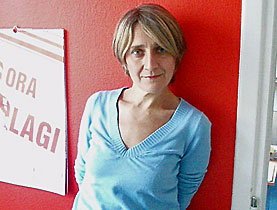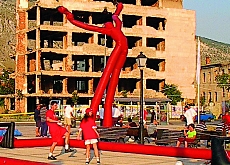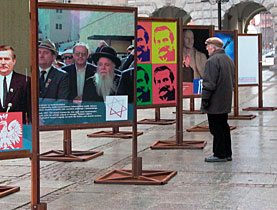Spreading the Swiss word in eastern Europe

Bookshops in eastern Europe may soon be stocking recent Swiss literature if Pro Helvetia, the Swiss Arts Council, has its way.
Pro Helvetia is planning to make literature its new priority in 2009, Ursula Kropiwiec, head of the Pro Helvetia liaison office in Warsaw, told swissinfo.
But the council is active in all areas of the arts. For the past three years it has had an emphasis on dance and on photography, she said.
Kropiwiec has a challenging job. Although she is based in Poland, she is also responsible for promoting projects in the rest of the so-called Vysehrad countries (Hungary, the Czech Republic and Slovakia), the three Baltic states (Estonia, Latvia and Lithuania) and Ukraine.
“They are very varied countries, culturally speaking,” she said. “It is also very personal. Sometimes it’s simply a matter of chance: somebody met somebody, and suddenly they started collaborating and the network quickly gets bigger and bigger.”
Pro Helvetia’s work is based on partnership between collaborators in Switzerland and in the countries of the area who are interested in working together. Kropiwiec has to find them and put them in touch with each other.
Translating literature
For the literature project things are now only in the planning stage. The idea is to promote Swiss works in small events at book fairs all over the region, and to work with publishers and other professionals to build a network.
“If a publisher wants to translate and publish a Swiss book, then Pro Helvetia can help pay for the translation,” she explained. But there is a lot of lobbying work to be done before it gets to such a point.
“We are thinking of making a list of authors to be promoted. We are going to ask for advice in Switzerland and in Poland.”
The Swiss classics – authors like Max Frisch and Friedrich Dürrenmatt – are already quite widely translated into the languages of the main countries which Kropiwiec looks after.
Her eyes light up at the idea that someone might like to translate the works of experimental writer Robert Walser, who, though highly regarded at home, is less well known outside Switzerland. But in general she would like to concentrate on newer works.
The project is a collaboration with the Germans and Austrians, and the French may also become involved, she explained.
If the literary project is only in its initial stages and its precise future uncertain, some past projects have enjoyed great success.
Past successes
Kropiwiec is particularly proud of a series of artistic events held in 2008 in the 10th Anniversary stadium in Warsaw, an iconic landmark for Poles.
Originally built as a prestige object by the Communist authorities, it later fell into disrepair and was turned it over to market traders, most famously Vietnamese. Known as Jarmark Europa, for a time it was the continent’s biggest open-air market. But now it is now to be completely rebuilt to host the 2012 European football cup.
Curator Joanna Warsza seized the chance to stage artistic events here just before it disappeared forever. Warsza, who had earlier been on a study trip to Switzerland organised by Pro Helvetia, invited three Swiss artists and groups – performance artist Massimo Furlan, Anna’s Kollektiv (a group of choreographers and architects), and the Schauplatz International theatre group – to take part in the highly successful programme.
Although the stadium performances were seen by the general public, Pro Helvetia often works indirectly, targeting its projects at professionals.
“In dance, for example, we organised many workshops for choreographers, also residencies for choreographers from our region in Switzerland. Or we’ve had Swiss choreographers coming to coach a company here in the region.”
Challenges
With such a large geographical area to look after, Kropiwiec cannot always be on the spot. It is no easy matter to find good partners in the other countries.
And there are sensitivities which it is not easy for outsiders to deal with, if they are aware of them at all.
“In the three Baltic countries you have a big Russian minority. When you go there you meet the main cultural actors and it’s as if the Russians don’t exist. Nobody even mentions them.”
So at the moment Pro Helvetia is treading very cautiously there.
“You have to be aware of what is going on and get advice from the locals. You cannot come along very naively and try to set up a project just because you think it would be good. As a first step we are trying to build up a small network of partners.”
Fostering dialogue and promoting encounters with other cultures is part of the mandate of Pro Helvetia. With the cultural diversity and political minefields which it faces, that’s just what the Warsaw office is doing all the time.
swissinfo, Julia Slater in Warsaw
Pro Helvetia, the Swiss Arts Council, was established in 1939, originally to defend Switzerland’s cultural identity in the face of propaganda from Nazi Germany.
It is now a foundation, whose structure and mission are laid down in a special law.
Its aims still include the preservation of Swiss cultural identity, but it also promotes cultural creativity and exchange, within Switzerland and abroad.
Its first foreign office opened in Paris in 1985.
It currently has liaison offices in Cairo, Cape Town, New Delhi as well as in Warsaw.
The Warsaw office has been in operation since 1992. Since 2005 it has also been responsible for the Czech Republic, Slovakia and Hungary, the Baltic states of Estonia, Latvia and Lithuania and also Ukraine.
Pro Helvetia in Poland works with other European partners. It is associated with Eunic – the European Union National Institutes for Culture – and participates in their projects.

In compliance with the JTI standards
More: SWI swissinfo.ch certified by the Journalism Trust Initiative




You can find an overview of ongoing debates with our journalists here. Please join us!
If you want to start a conversation about a topic raised in this article or want to report factual errors, email us at english@swissinfo.ch.